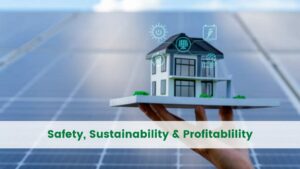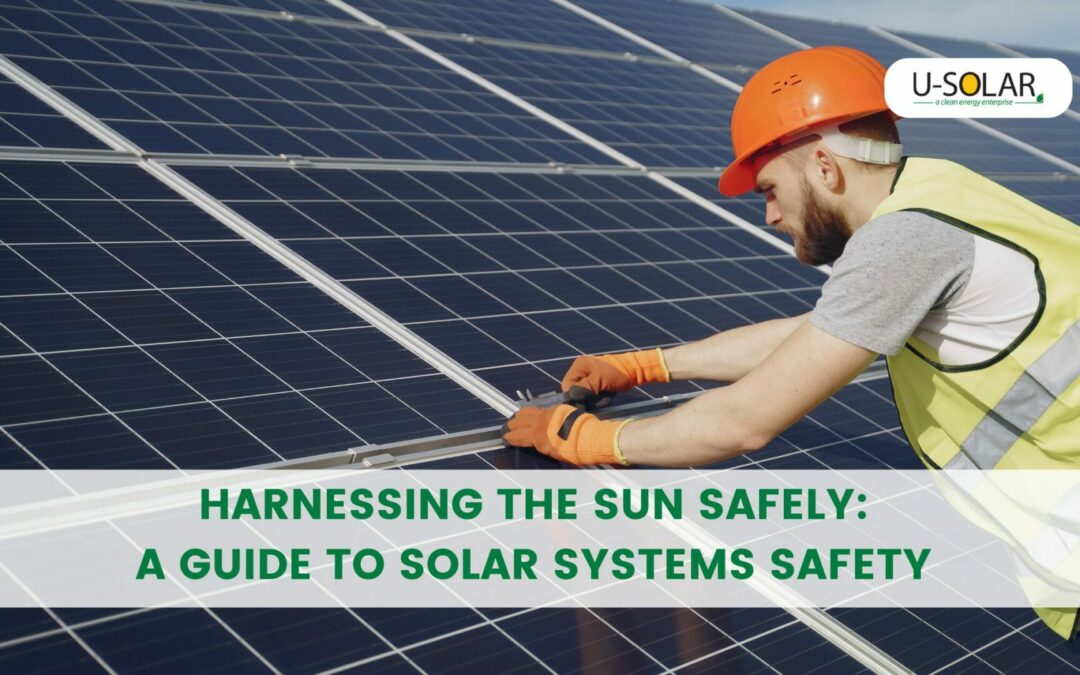Solar energy is a rapidly growing clean energy source, offering a sustainable path to power our homes and businesses. As we harness the sun’s power, safety remains a top priority. While solar panels themselves are generally safe, installation, maintenance, and even everyday operation involve considerations to minimize risk. This blog delves into the essential aspects of safety in solar systems, ensuring you can reap the benefits of clean energy with complete confidence. By understanding and implementing these safety measures, you can enjoy the sunshine powering your life without unnecessary risks.
Safety Checklist During Solar Panel Installation
The installation process is where most safety concerns lie. Here’s how to ensure a smooth and safe installation:
- Pre-Installation Planning: Before any work begins, a thorough site inspection should be conducted to identify potential hazards like weak roof sections, electrical lines, or nearby trees that could interfere with the installation.
- Permitting and System Shutdown: Ensure all necessary permits are obtained from local authorities. If the existing system needs to be disconnected, a qualified electrician should handle this safely to prevent accidental energization.
- Professional Installation: Opt for a licensed and insured solar installer. They have the expertise and equipment to handle the job safely.
- Roof Safety: Working on roofs is inherently risky. Installers should use proper fall protection equipment like harnesses and lifelines.
Electrical Safety During Installation
- Permits and Inspections: Obtain the necessary permits to ensure your installation adheres to electrical safety codes. Local authorities will inspect the system before it goes online.
- Qualified Electricians: Only qualified electricians with experience in solar systems should handle electrical wiring and connections.
- Proper Grounding: A properly grounded system prevents electrical shock hazards.
- Labeling and Identification: Clearly label all electrical wires and components within the solar system for easy identification during future maintenance or troubleshooting.
- Arc Fault Protection: Consider incorporating arc fault circuit interrupters (AFCIs) into the solar system’s electrical wiring. AFCIs can detect and interrupt dangerous electrical arcing events that could potentially ignite fires.
Long-Term Safety of Your Solar System
Once your solar panels are up and running, maintain a safety focus.
- Regular System Inspections: Schedule annual inspections by a qualified solar technician to identify potential issues like damaged wiring or loose connections.
- Fire Safety: Keep the area around your solar panels clear of flammable debris. Regularly check for any signs of overheating in the system’s components.
- Electrical Maintenance: Turn off the system’s DC disconnect switch before performing any maintenance on the panels or electrical components.
- Animal Deterrence: Small animals like birds or rodents might be tempted to nest around your panels. Consider installing bird diverters or mesh screens to deter them from creating potential fire hazards with nesting materials.

Safety Advantages of Solar Power
While safety is a priority, it’s important to recognize the inherent safety advantages of solar energy:
- Reduced Reliance on Fossil Fuels: Solar power reduces your dependence on fossil fuels, which are linked to environmental hazards and air pollution.
- Lower Fire Risk: Solar panels pose a significantly lower fire risk compared to traditional energy sources like gas or oil.
- Sustainable Future: By embracing solar, you contribute to a cleaner and safer environment for future generations.
- Non-Toxic Materials: Solar panels are primarily made from silicon, a widely abundant and non-toxic material. This reduces the risk of exposure to harmful chemicals compared to some traditional energy sources.
- Passive Operation: Unlike conventional power plants that involve complex machinery with moving parts, solar panels are passive systems. This eliminates the risk of mechanical failures or explosions associated with traditional energy generation.
- Community Resilience: By generating your own power with solar, you become less reliant on the central grid. This can be advantageous during power outages, providing backup power and a sense of security during natural disasters or grid failures.
Conclusion: A Bright and Safe Future with Solar
Solar energy offers a clean, sustainable path to power your home or business. By prioritizing safety during installation and maintenance, you can harness the sun’s power with confidence. At U-Solar, safety is our top priority. Our experienced team is dedicated to ensuring every installation and maintenance procedure adheres to the highest safety standards. With U-Solar by your side, you can rest assured that your solar journey is not only environmentally friendly but also secure. Remember, a little caution goes a long way in ensuring a bright and safe future with solar.
Frequently Asked Questions (FAQs)
- Can solar panels cause electrical fires?
Solar panels themselves are very unlikely to cause fires. However, improper installation, damaged wiring, or lack of maintenance can increase the risk. Regular inspections and professional installation minimize this risk.
- What should I do if my solar panels are damaged?
Never attempt to fix damaged solar panels yourself. Contact your installer immediately. Damaged panels pose an electrical shock hazard and should be handled by a qualified professional.
- Can I clean my solar panels myself?
While cleaning your panels isn’t strictly forbidden, it’s generally recommended to leave it to professionals. They have the proper equipment and safety gear to clean panels safely and efficiently.
- What happens to my solar system during a power outage?
For safety reasons, most grid-connected solar systems automatically shut down during a power outage. This prevents the system from feeding electricity back into the grid and potentially harming utility workers.
- Is solar energy safe for the environment?
Absolutely! Solar power is a clean and renewable energy source. Unlike fossil fuels, it doesn’t produce harmful emissions or contribute to air pollution.
Need Professional Consultation?
At U-Solar, we offer expert consultations and services designed to keep your solar panels in prime condition and functioning at their best. Our team of certified professionals specializes in a comprehensive suite of maintenance services, from intricate electrical and structural inspections. We understand that each solar installation is unique, and we tailor our approach to meet the specific needs and challenges of your system. We ensure that your solar power system remains efficient, reliable, and capable of delivering maximum energy output.
Contact us today to learn how we can help you achieve optimal solar power performance through professional maintenance solutions.

